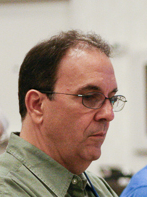
Photo credit: Eric Arbitter
There is currently a financial crisis in Puerto Rico. The government’s debt is more than $72 billion and it missed a payment for the first time in August. The local economy has been in recession for ten consecutive years. Some of our ICSOM colleagues have had to deal with the effects of economic crises, but the structure of the Puerto Rico Symphony Orchestra (OSPR) makes the difficulties of our situation unique. (I highly recommend the book Las Mieles del Alba, written by the Puerto Rican composer Aponte Ledee, which is a must for understanding the political/cultural/historical intricacies that make up our “DNA” as classical musicians in Puerto Rico.)
Puerto Rico has been a territory of the United States since 1898, but only in 1948 did it get its first elected Governor, Luis Muñoz Marín. Muñoz Marín had a friendship with the self-exiled Spaniard, Maestro Pablo Casals, whose mother was Puerto Rican. At that time Casals, already a renowned cellist, opposed the dictatorship of Franco in Spain and made his home in Puerto Rico.
These two personalities, one from the world of politics and one from the world of classical music, united to create the OSPR in 1956. Two years later they founded the Puerto Rico Conservatory of Music. Initially the two institutions operated under the Puerto Rico Industrial Development Authority, and musicians were offered a position both in the conservatory and the orchestra.
The OSPR was thus created not through the wishes of private citizens who desired an orchestra. It arose from an idea shared by a politician and a musician: the musician sought to promote what he believed to be the best music for the people, and the politician sought to portray himself as the creator of this “victorious” idea—an idea that would help lure investors to Puerto Rico. It worked, and Puerto Rico’s industrial economy flourished at the time.
From its inception, the OSPR was linked to the AFM. The first musicians were brought in from the states and all were members of the AFM. The AFM rapidly obtained contracts for virtually all musical activity in Puerto Rico at the time: hotels, radio and TV stations, recordings, and the OSPR.
The government of Puerto Rico created the OSPR as a government-owned corporation. Labor relations are governed by Puerto Rico Labor Laws, which are analogous to federal labor law in the states. But there is one key distinction between the OSPR and most orchestras in the states: as a government-owned corporation, the members of the Board of Directors are named by the Governor.
In practice, this means Board members respond to the needs of the present government—not the needs of the corporation. It also means that every four years, with the change of the gubernatorial administration, the Board and the management are entirely replaced—they start da capo. And in contrast with many of our fellow ICSOM orchestras, our musicians are legally prohibited from serving on the Board.
These limitations, seen from afar, may seem minor. But the consequences are significant. Legally, the OSPR management has the capacity to raise funds for the orchestra and to meet the needs of the corporation, for the benefit of the orchestra. But customarily they have depended totally on the funds the government gives them.
As I write this article the Government of Puerto Rico has declared itself in a fiscal crisis. There are talks of partially closing the government, downsizing the government workforce, and cutting part of the paid work-week.
We expect that the management’s reaction to this will be to say that they cannot operate with a smaller budget, while they continue operating a smaller classical program of some sort. The Casals Festival will most likely be saved, and foreign orchestras or chamber ensembles will be used so that the marketing has more impact with the regular classical audience. In February, 2006, management refused to sign a three-year CBA with a total cost of three million dollars, stating that they did not have the budget; they then turned around and spent over five million dollars on the Casals Festival—in only four weeks.
Since October, 2015, the OSPR has produced six concerts of the music of the different Star Wars movies. It started with one concert programmed in the season, and because of requests from the public, five more (and counting!) have been played. The musicians have had to “fight” with management to allow them to take place—sacrificing overtime and playing on free days. These concerts have sold out, most of them in less than four hours, but the only publicity for the concerts was done through the OSPR’s Facebook page.
The musicians of the OSPR have not had a salary increase or improvements in benefits for more than ten years. As a result of the current crisis, we anticipate losing some of those benefits from our CBA—including our Christmas bonus and some health insurance payments—by government decree. We also understand that some Board members may be privately funding another orchestra to do run-out concerts outside the metro area, because management says that we only play in San Juan. This cannot be farther from the truth: we are willing to play wherever management takes us and we have played outside the metro area countless times.
Under these conditions we are preparing to negotiate a successor to the CBA that expires in June 2017. We hope we will make it to that point, with the support that we know we have from the AFM and ICSOM.





